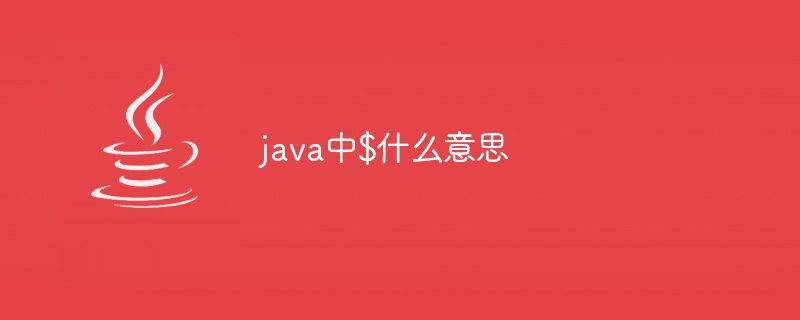What does $ mean in java?
The $ symbol in Java is used in anonymous inner classes to access local variables or parameters of the outer class: $outerVar: access local variables of the outer class. $outerParam: Access parameters of external classes.

The meaning of $ in Java
$ in Java is usually used to represent local variables in anonymous inner classes or parameters.
Anonymous inner class
An anonymous inner class is an inner class without a name that is defined directly in the context in which it is created. The syntax is as follows:
new SuperClass() {
// 匿名内部类的成员
};$ Function
In an anonymous inner class, the $ symbol is used to access local variables or parameters of the outer class. It means that local variables or parameters in the outer class are available in the anonymous inner class.
Example
class OuterClass {
int outerVar = 5;
void outerMethod() {
int outerParam = 6;
new Thread(() -> {
// $outerVar 可以访问外部类的局部变量 outerVar
System.out.println("$outerVar: " + $outerVar);
// $outerParam 可以访问外部类的参数 outerParam
System.out.println("$outerParam: " + $outerParam);
}).start();
}
}It should be noted that the
- $ symbol can only be used in anonymous inner classes , it has no special meaning in other contexts. The
- $ symbol can only be used to access local variables or parameters of an external class, but cannot be used to access methods or fields of an external class.
- If there are multiple local variables or parameters with the same name in the outer class, you need to use explicit qualifiers (such as this.$outerVar) to specify the variables to be accessed.
The above is the detailed content of What does $ mean in java?. For more information, please follow other related articles on the PHP Chinese website!

Hot AI Tools

Undresser.AI Undress
AI-powered app for creating realistic nude photos

AI Clothes Remover
Online AI tool for removing clothes from photos.

Undress AI Tool
Undress images for free

Clothoff.io
AI clothes remover

AI Hentai Generator
Generate AI Hentai for free.

Hot Article

Hot Tools

Notepad++7.3.1
Easy-to-use and free code editor

SublimeText3 Chinese version
Chinese version, very easy to use

Zend Studio 13.0.1
Powerful PHP integrated development environment

Dreamweaver CS6
Visual web development tools

SublimeText3 Mac version
God-level code editing software (SublimeText3)

Hot Topics
 1377
1377
 52
52
 How does Java's classloading mechanism work, including different classloaders and their delegation models?
Mar 17, 2025 pm 05:35 PM
How does Java's classloading mechanism work, including different classloaders and their delegation models?
Mar 17, 2025 pm 05:35 PM
Java's classloading involves loading, linking, and initializing classes using a hierarchical system with Bootstrap, Extension, and Application classloaders. The parent delegation model ensures core classes are loaded first, affecting custom class loa
 How do I implement multi-level caching in Java applications using libraries like Caffeine or Guava Cache?
Mar 17, 2025 pm 05:44 PM
How do I implement multi-level caching in Java applications using libraries like Caffeine or Guava Cache?
Mar 17, 2025 pm 05:44 PM
The article discusses implementing multi-level caching in Java using Caffeine and Guava Cache to enhance application performance. It covers setup, integration, and performance benefits, along with configuration and eviction policy management best pra
 How can I use JPA (Java Persistence API) for object-relational mapping with advanced features like caching and lazy loading?
Mar 17, 2025 pm 05:43 PM
How can I use JPA (Java Persistence API) for object-relational mapping with advanced features like caching and lazy loading?
Mar 17, 2025 pm 05:43 PM
The article discusses using JPA for object-relational mapping with advanced features like caching and lazy loading. It covers setup, entity mapping, and best practices for optimizing performance while highlighting potential pitfalls.[159 characters]
 How do I use Maven or Gradle for advanced Java project management, build automation, and dependency resolution?
Mar 17, 2025 pm 05:46 PM
How do I use Maven or Gradle for advanced Java project management, build automation, and dependency resolution?
Mar 17, 2025 pm 05:46 PM
The article discusses using Maven and Gradle for Java project management, build automation, and dependency resolution, comparing their approaches and optimization strategies.
 How do I create and use custom Java libraries (JAR files) with proper versioning and dependency management?
Mar 17, 2025 pm 05:45 PM
How do I create and use custom Java libraries (JAR files) with proper versioning and dependency management?
Mar 17, 2025 pm 05:45 PM
The article discusses creating and using custom Java libraries (JAR files) with proper versioning and dependency management, using tools like Maven and Gradle.




